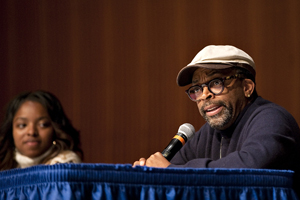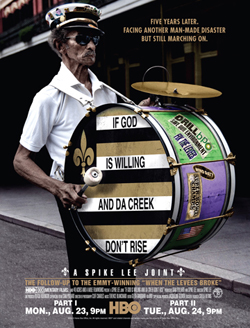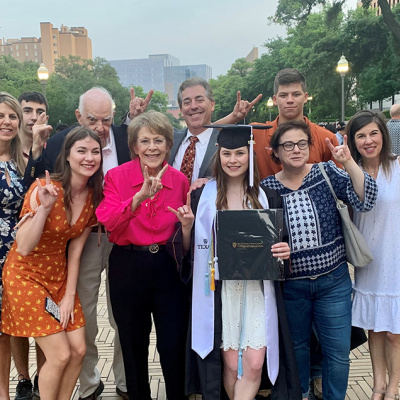Spike Lee Screens BP Oil Spill Documentary On Campus [Watch]

Has this summer's BP oil spill since receded from your mind?
Spike Lee's got the medicine you need.
The brash and award-winning director, visiting campus Sunday, screened portions of his new documentary, If God Is Willing And Da Creek Don't Rise.
It's strong stuff, but Lee infuses it with the folksiness and humor that make it real rather than preachy.
One Louisiana man drew laughter from the 600-member audience, for instance, when he shared on film his reaction to a British oil company inflicting harm on its former colony. "Growing up, I thought the Chinese or the Japanese were coming for us," he said, "I never thought it would be the British. We better make T-shirts: 'The British Are Coming Back!'"
The film is a follow-up to Lee's documentary on Hurricane Katrina, When the Levees Broke.
His crew had already finished filming more on the aftermath of the storm when, on April 20, the Deepwater Horizon oil rig exploded in the Gulf of Mexico. Eleven people were killed, and millions of barrels of oil blasted into the ocean over the next 86 days.
Lee knew he had to scrap the last hour of film and cover the disaster as it became became the largest environmental catastrophe in U.S. history, many times surpassing the 1989 Exxon-Valdez spill.
Tragically, the BP spill hurt many of the same Louisianans who had been harmed by Katrina five years before.
The interviews Lee's crew did will be an invaluable oral history of the disaster, said Douglas Brinkley, a noted Rice University historian who introduced Lee on Sunday.

Regulators, fishermen, historians, musicians, politicians, and celebrities like Brad Pitt and Anderson Cooper were among those who shared their perspective on Louisiana and all it has faced in If God Is Willing And Da Creek Don't Rise.
As ever, Lee did not shy away from calling out the political, racial, and class dynamics he sees at play.
He filmed Cooper and Brinkley, for instance, agreeing that if so much oil had spilled into Cape Cod, Nantucket, or the Hamptons, the response would have been more outraged.
Lee talked sparingly after the screening.
"The film speaks for itself," he said. "I'm glad we're having this. There should be many more panels, seminars, and films about this thing, because it's not over."
But how to make sure BP truly pays for the damage it caused, and that people are protected from similar disasters in the future? There was a telling moment in the roundtable discussion after the film when associate UT professor Shirley Thompson asked how people should take the information presented in Lee's film and translate it into action.
"How do we go from there to build the kinds of political coalitions that are necessary?" she asked.
Paul Stekler, chair of UT's Radio-TV-Film Department and an authority on New Orleans, said the political anger in Louisiana now seems to be more aimed at the federal government for issuing a six-month moratorium on drilling.
Beyond that, the answer to Thompson's question was silence.
Spike Lee, right, in a roundtable discussion with UT student and New Orleans native Camille Pluck. Photo courtesy of the Daily Texan.






